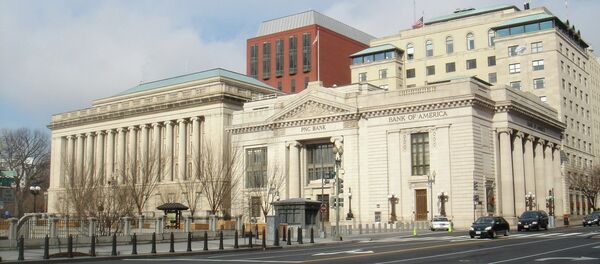Kristian Rouz — The US government seeking to leverage more social responsibility in the nation's corporate sector might have won a decisive victory in the multi-year proceedings over the biggest financials' bond sales during the period between years 2005 and 2007, that allegedly triggered a subsequent mortgage and financial crisis. The banking group, Goldman Sachs, reported to have agreed to pay a $5.1 bln to settle the dispute with the US Department of Justice and attorney generals of Illinois and New York, resulting in their Q4 earnings shrinking by roughly $1.5 bln.
The past financial year would be less profitable for Goldman and other financials like Morgan Stanley as well, as their litigation expenses caused by the Justice Department probe, have been record high in recent years.
The Goldman-proposed deal might create a precedent supporting the US government's drive to hold the financial corporations accountable for the subprime mortgage securities' meltdown in 2007. However, even the multibillion payoffs to those ruled affected are significantly lower than the overall damage caused by the late 2000s crisis in the US and internationally.
Goldman, in their turn, agreed to pay some $2.39 bln in civil penalties, $875 in cash and $1.8 bln in consumer benefits to those affected by the subprime crash as provided by their agreement with the government.
Such an outcome, although impairing Goldman's 2015 financial results, is seen as a better solution than any further court proceedings with the government. During the first three quarters of 2015, the bank had lost some $2.41 bln in legal and litigation costs, nearly equaling that during the previous two financial years combined. The final settlement, therefore, will only negatively influence Goldman's Q4 earnings, with the prospect financial results unaffected in 2016, allowing for a brighter outlook.
That is, unless the US government decides otherwise, filing potential new probes into the institution, as the payoffs are almost negligible compared to financial losses sustained by the economy at the height of the subprime crisis, when Washington had to interfere and bailout key institutions.
However, Goldman is aiming at a final resolution with all parties involved, including existing and potential claims from the US Department of Justice, the New York and Illinois Attorney Generals, the National Credit Union Administration and the Federal Home Loan Banks of Chicago and Seattle.
Goldman will report its Q4 financial results next week. Expected at about 1.5$ lower, they might add pressure to the US stocks already battered by the commodities and mainland China financial turmoil.
The US government's approach targeting financial institutions instead of individual employees, however, is causing a significant uproar in the corporate sector. The probes into subprime crash aim to hold an entire organization responsible for the bad decisions taken by particular people, resulting in higher government-related risks for the regular functioning of the US financial sector.
Insurance companies, however, expect to benefit greatly as doing business risks rise, meaning Washington's push to achieve greater social justice is potentially coming at the cost of economic freedom.


